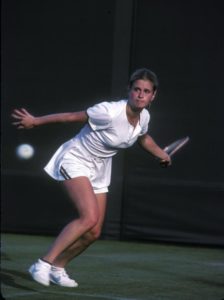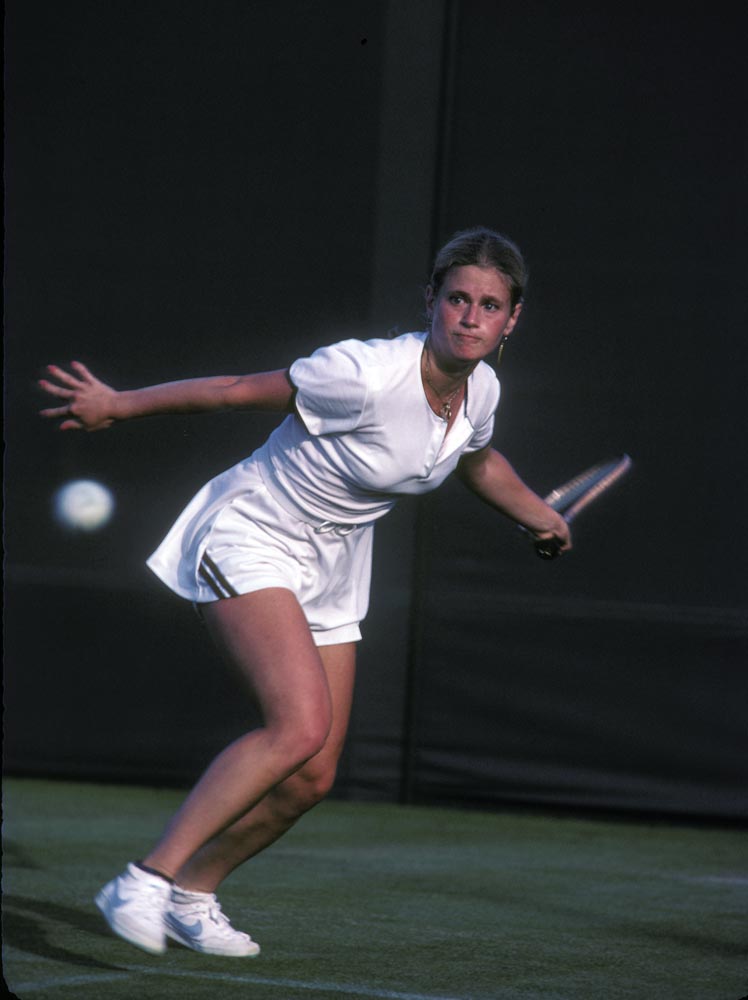FEATURES | By Stacy Margolin Potter
The Match Must Go On
With “The Ojai” cancelled for the first time since World War II, six-time champion and ITA Hall of Famer Stacy Margolin Potter reflects on the year sickness did not stop her

Stacy Margolin Potter at Wimbledon
“The Ojai.” Mention that to a tennis player or spectator and visions of the tea tent and the clinking of fine china, fresh squeezed orange juice, the scent of orange blossoms in the valley and spectacular gritty tennis comes to mind.
For me, “The Ojai” conjures up memories of watching the hunky collegiate guys six years my senior on the main court, staying with a wonderful family and winning the 14s, 16s singles and doubles and Women’s Open division by the time I was 18.
At age 16, I vowed I would live there one day. Amazingly, 20 years later, that’s exactly what happened.
Now, in the spring of 1979, I was playing in The Ojai in a slightly different way. Yes, I was playing in the individual Pac 10 Singles Division, but I was playing No. 1 for the University of Southern California, and the way this kind of event worked was that each match any of us Trojans won were added up to determine which team was the best at the end of the tournament. I felt proud and honored to be a part of this school, playing alongside my teammates. What added to my pride was that my brother (himself a varsity tennis player and competitor at The Ojai), mother and uncle had all attended USC.
So there we were, the 1979 Trojans, staying in one room at one of the local hotels in town.
As the tournament got under way, three of us had won our first-round matches. Nothing feels better than winning and going out together with your team for dinner. One of my teammates and I shared a roast beef salad. We all enjoyed the banter and camaraderie and soon enough we were back at our hotel, getting ready for bed. We all needed to be up early for the next day’s matches that began at 8 a.m.
At approximately 2 a.m., I heard one of my teammates get up to go to the bathroom. Then another. Soon enough, I was the third in line, throwing up dinner. We took turns throughout the night. The next morning I felt weak as a kitten — achy, sweaty, as if a truck had just run over me. I didn’t know how I’d make it through breakfast and a warmup, let alone my quarterfinal match. I remember one of my teammates saying, “you’ve got to eat something Stace” and I managed to eat a quarter of a piece of toast with half a glass of orange juice. After all, there’s nothing better than Ojai orange juice.
I won my quarterfinal match easily. But early that afternoon, I was due to play another match, this time against a very formidable opponent, Stanford’s No. 2. I remember feeling nothing in my legs; my arms felt like noodles, but my body, especially my legs, felt so relaxed. This relaxed feeling translated to a rather tranquil demeanor. This turned out to be beneficial. My body didn’t exert one ounce more energy than necessary, which led to precise hitting and laser-like focus.
Up against an opponent I knew would usually challenge me in a major way, I won 6-0, 6-0. This was shocking.
I was now in the finals, to be played the next day on Court No. 1 at Libbey Park. Those high-stakes matches on historic courts like Libbey are what ambitious tennis players dream about. But I still wasn’t fully recovered.
My opponent was Kathy Jordan, Stanford’s No. 1. At that point in time, she and I were going back-and-forth to determine who was the No. 1 college player in the country. So there was a lot on the line.
What I had going for me was that I was playing well, felt relaxed but still aggressive, and had the knowledge that for so long, this was my tournament. I felt good in Ojai. I knew my hard-striking, run-‘em-down style matched up nicely versus Kathy’s attacking serve-and-volley game.
I had a plan and I was going to stick with it. We battled, often with exceptional tenacity, exciting the packed crowd with either a winning volley from Kathy or a running down-the-line winner from me.
I wanted this match badly and the fire was in my belly. Before I knew it, the match was over, 6-3, 6-4 and I emerged victorious. It didn’t matter that I was sick as a dog with fever and chills and barely ate for three days. I wanted this collegiate title and that medal around my neck. I wanted it for me and my team. It was pure grit and determination that pulled me through.
This was my Ojai and I told myself, before that final match, “The Show Must Go On!”


Leave A Comment